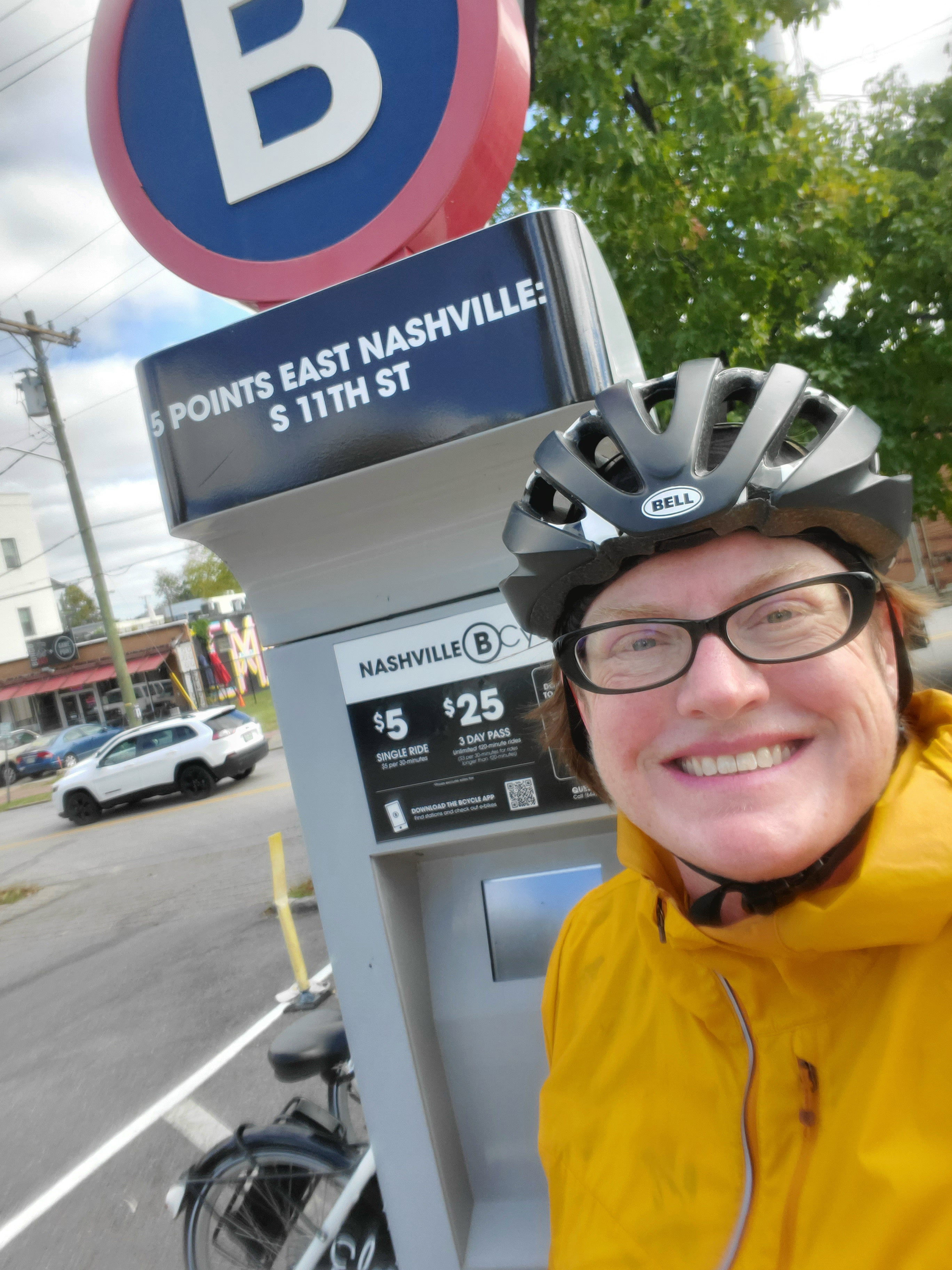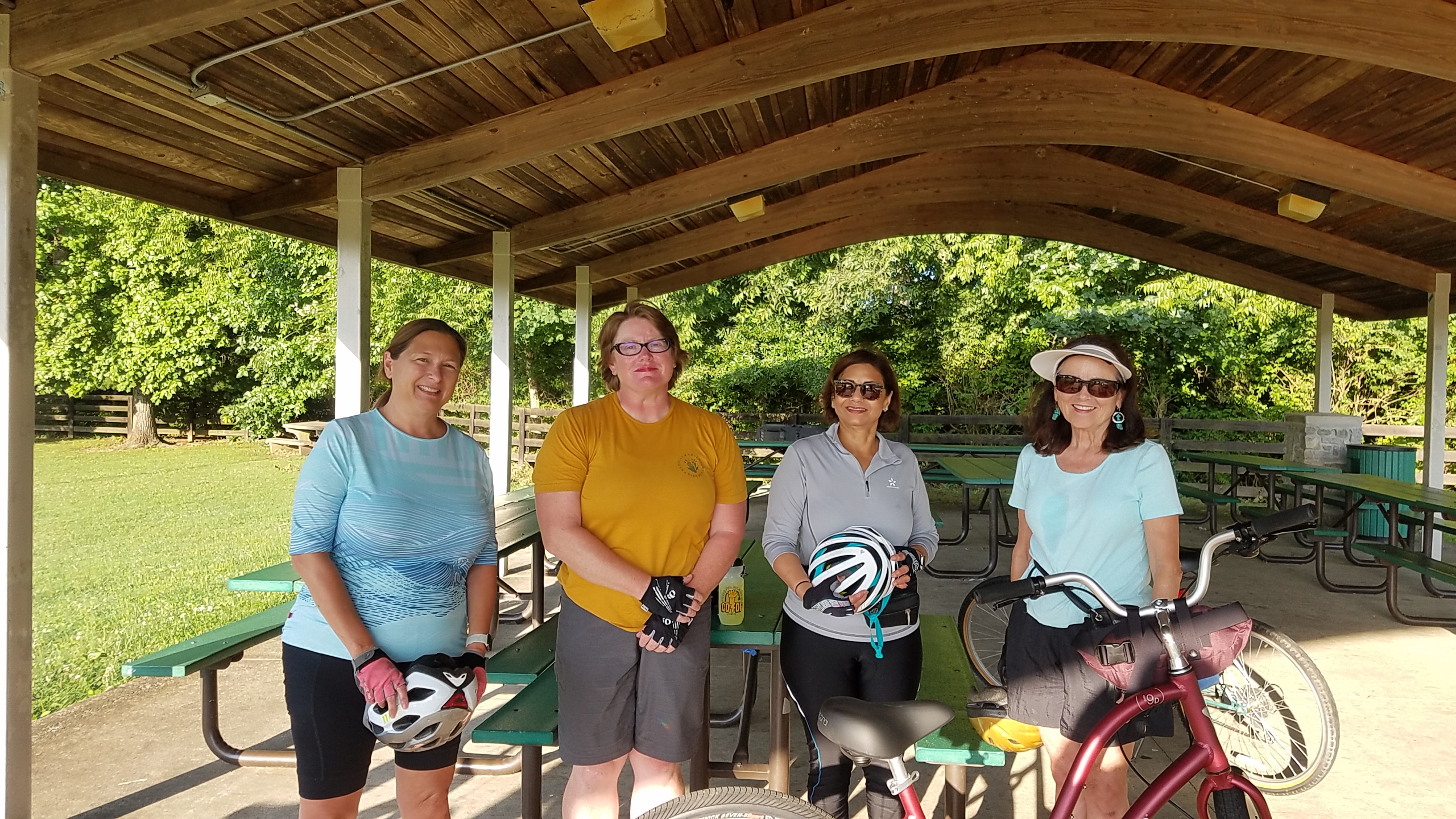DISCOVER YOUR LOCAL BICYCLING COMMUNITY
Find local advocacy groups, bike shops, instructors, clubs, classes and more!
LCI Spotlight: KJ Garner
The League certifies hundreds of League Cycling Instructors every year and there are thousands of LCIs around the country leading bike education efforts in their communities. In our LCI spotlight series, we are sharing the stories of League Cycling Instructors doing what they do every day: educating, mentoring, empowering. You don’t have to be an extraordinary athlete or overachieving student to be a stellar LCI, all you need is the conviction that life is better for everyone when more people ride bikes.
 Our latest League Cycling Instructor in the spotlight is a great example that some of the best joys in life can come from something initially met with resistance — especially when it comes to being on a bike! Meet KJ Garner, a bicycling enthusiast and educator in Madison, Tennesee. Find our earlier LCI Spotlights in our blog archives.
Our latest League Cycling Instructor in the spotlight is a great example that some of the best joys in life can come from something initially met with resistance — especially when it comes to being on a bike! Meet KJ Garner, a bicycling enthusiast and educator in Madison, Tennesee. Find our earlier LCI Spotlights in our blog archives.
After learning the joys of biking changed her own life, KJ now works with riders of all experience levels, ages, and backgrounds to help get more people riding and states that she is “truly convinced that life is better on a bicycle”. Read on to learn how KJ motivates her students to choose bicycling as their outlet.
Learn how to become an LCI in the Smart Cycling section of our website.
ARE THERE LOCAL BIKE GROUPS YOU’RE A PART OF?
Bike Fun (non-profit) – founder & board president; Walk Bike Nashville – volunteer & former board officer
TELL US A LITTLE ABOUT YOURSELF AND WHY YOU ENJOY TEACHING OTHERS TO BIKE.
Bike riding saved my life. In 2010 I was physically inactive, recently dumped out of a long-term relationship, and depressed. I remembered how much I enjoyed bike riding when I was in college, and I purchased a new-to-me hybrid-style bike. First, I rode in my neighborhood, then on greenways, and finally built up to riding in a 30-mile agrotour in Athens, GA with a friend. By then I had purchased a brand new bicycle and loaned my friend my other one. I started working in the outdoor retail industry in 2015 not long after completing my LCI program through Walk Bike Nashville.
I encountered a lot of returning riders who were enthusiastic to get on a bicycle again, but who were low on confidence about their abilities – as well as adults who had never learned to ride. I was able to point them towards the adult cycling classes that Walk Bike Nashville offered, and often was their instructor as well. To see their delight at “getting it” is unparalleled. As a result of inquiries from adult students as well as from parents of children who just couldn’t quite make that jump from training wheels, I founded Bike Fun in 2016 – and in 2020, transitioned to a non-profit.
WHAT FIRST MOTIVATED YOU TO BECOME AN LCI?
I initially resisted becoming any kind of educator – I had previously been at college to pursue that academic path and it failed wildly. Over the course of my life, I have been the person of whom many friends – and total strangers! – would ask advice and opinions. I have therefore leaned into the role in which others have placed me – putting their trust in me as a person with understanding, curiosity, a broad background, and empathy.
Seeing little attention paid to casual or beginning riders from traditional bicycle clubs and groups encouraged me to get involved with Walk Bike Nashville, who footed the bill for the LCI training and – in return – their sponsored LCIs would teach classes.
WHAT HAS BEEN YOUR GREATEST REWARD IN TEACHING BIKE EDUCATION?
I am motivated to continue doing what I do when I get to see young girls and FTW folks completely lose their mind at how awesome it feels to take that first one-mile, five-mile, 10-mile ride; to feel the wind on their face; to understand that this is a powerful step in reclaiming ownership of one’s body and spirit.
WHAT IS YOUR BEST PIECE OF ADVICE FOR AN LCI WHO WANTS TO TEACH A CLASS BUT ISN’T SURE HOW TO GET STARTED?
It always helps me to start with a summary. What do you want to teach? Pick a topic and then list 3 points about that topic you want to convey. Create a “catalog listing” (e.g. short teaser paragraph about the class) that hits the highlights. Consider your audience – is it more general? Is it a very specific topic? Is it accessible? Does it take into consideration potential student limitations? If you’re preparing handouts or presentation slides, do the people featured in any pictures reflect a truly diverse slate of bicycle ridership (or is it just pictures of white men in spandex)?
Be prepared to answer student questions with a response of “I don’t know – but I can find out and get back to you”. For each class or activity I teach, I keep notes on and revise my syllabus based on student feedback, so make sure to send out a follow-up survey (even if it’s simple, like “What did you like about the class?”). There are lots of good frameworks to be found within the LCI community and with the LAB documents in general, so you don’t have to start completely from scratch.
WHAT IS SOMETHING YOU THINK THAT ALL LCIS SHOULD KNOW ABOUT TEACHING BIKE EDUCATION?
- It is very difficult to rewire language that has been accepted into American society’s common vernacular. I make it a point to say crash not accident; to gently push back when someone says they are “out of shape” (I speak of strength and endurance); to not weaponize exercise as a punishment for eating or for existing in contemporary culture that wants us to “shred” or to “feel the burn”. When students tell me they are scared to ride on the roads in a shared vehicle mix, I completely understand – and then make sure they know how, as drivers, to interact with riders who are able to physically and mentally navigate those situations.
- I never tell a student what *not* to do. As soon as you utter the words, “Don’t do this or X might happen,” it’s the only thing that student can think about. Especially kids! Overprepare them to do the *right* things and once they are achieving success in that arena, *then* consider telling them the other consequences. I have a scar on my chin from when I was 4 or 5, and was riding on the back of a neighbor’s bike. We’d go out for a ride regularly. She told me, “Don’t stick your foot in the spokes!” And I thought, well, she never told me not to do that before! Interested in seeing what would happen, I – you guessed it – stuck my foot in the spokes. Fortunately, there were only minor injuries – but I have a little reminder of never telling a student what *not* to do.
- Don’t feel discouraged if your student *doesn’t* “get it”. Each rider is different and has different levels of anticipation, anxiety, trauma, learning types, etc. Your job as the teacher is to assess and regroup constantly – especially in a group learning activity. Establishing a connection early on with each student that you can be trusted, that you care about their progress, and that every human learns at their own pace is critical. The fastest learners I’ve had took about 20 minutes to teach, with no prior independent movement on two wheels; the ones who have taken the longest might have been 8 to 10 hours over the course of a few months. Some learners need lots of practice in between direct instruction – and that’s OK!
WHAT IS YOUR FAVORITE MEMORY FROM BEING ON A BIKE?
Riding on the Chief Ladiga Trail in 2017 with my dog, Frankie. See the blog about it here: http://www.nashvillebikefun.com/2018/02/16/bikepacking-with-frankie/. The following year I went back with Frankie and my partner – now husband – Jeff.
GIVE US AN INTERESTING OR FUNNY FACT ABOUT YOU.
In 2020, I saved someone’s life & became a live-in caregiver for 5 months, fixed up and sold my old house, painted the inside of the new house, started a non-profit, and got married. After that year, there is very little I feel I cannot do.
Know an LCI who should be featured next? Nominate a stellar bike educator here!
